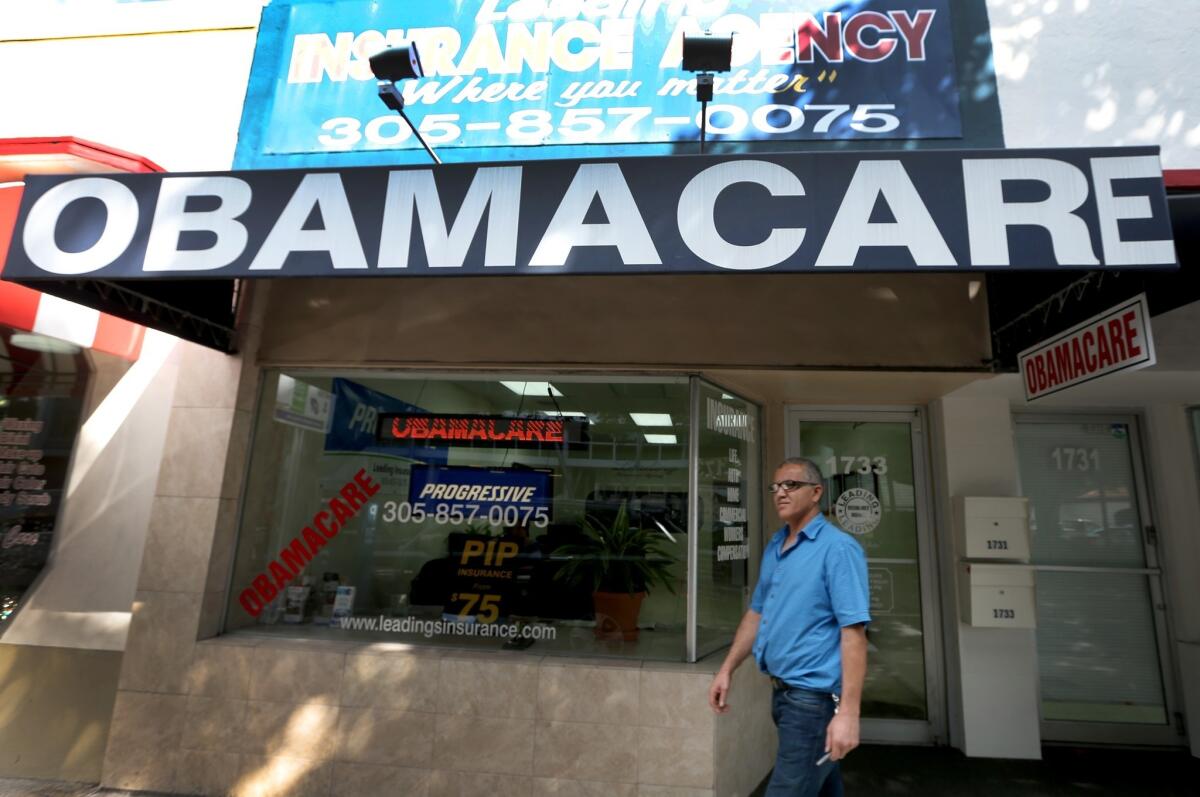Obama breathes life into canceled health plans -- again

- Share via
The Obama administration wrote a new chapter Wednesday in the “if you like your health plan, you can keep it” chronicles, decreeing that plans it once derided as “junk” or “substandard” can remain in effect until October 2017 -- long after the next presidential election. The point, administration officials say, is to help those in the market for individual or small-group plans make a smoother transition into Obamacare.
As you may recall, President Obama repeatedly promised that the 2010 Affordable Care Act (better known as Obamacare) would not force people to change insurance plans. But the law also set new minimum standards for coverage and financial value that all plans had to comply with by Jan. 1, 2014. The only exception was for policies that had been renewed without change since before the law was enacted; these “grandfathered” policies could continue to be renewed but not sold to any new customers.
The standards attracted little notice until insurers started notifying millions of customers last year that their policies were being canceled because they didn’t pass muster. One common problem was the lack of maternity coverage; another was excessive out-of-pocket costs. The wave of cancellations triggered such outrage, Obama unilaterally decided in November to grandfather any policy held in 2013 by an individual or small group.
That was a breathtaking departure from the text of the Affordable Care Act, and it undermined the law’s efforts to make the individual and small-group markets function as well as the large-group market does. On the other hand, it helped Obama honor a pledge he never should have made.
Now the administration is going further, allowing any policy held in 2013 to be renewed for two additional years. The extension is available for policies effective on or before Oct. 1, 2016, meaning that noncompliant coverage could continue well into 2017, depending on the policy’s renewal date.
The idea, said a senior administration official (who spoke on the condition that he not be quoted by name), was to wait as the natural churn in the insurance market moved most of the people still holding noncompliant plans -- roughly 500,000 individual policyholders and 1 million in small-group plans -- into compliant ones. By the time 2016 rolls around, this official said, there will be no wave of cancellations, just “a very small number.”
There’s an obvious political benefit too, even if the administration won’t cop to it. The initial reprieve granted by Obama would still have led to a fresh batch of policies being canceled in the weeks before an election, reminding voters how much they dislike Obamacare and the people who championed it.
The Times’ editorial board urged the administration last month not to extend the life of noncompliant policies any further. But we’re probably in the minority on this one. Public support for those policies, which tend to be significantly less expensive than compliant policies because they’re not as comprehensive, seems pretty strong. So strong, in fact, that a California state senator filed suit against the state’s new insurance buying exchange for forcing the cancellation of too many health plans that didn’t meet the new standard.
The exchange, called Covered California, required insurers to stop offering noncompliant plans in the individual or small-group markets if they wanted to offer policies to Covered California’s shoppers. The exchange’s board of directors refused to budge on that issue even after Obama granted the reprieve in November.
Not that California is alone in that respect; a senior administration official said about half the states wouldn’t allow noncompliant policies to be renewed. But the administration’s new plan would allow those states to change their minds and reinstate canceled policies (for two years, at least) for anyone who held them in 2013.
Anyway, Sen. Ted Gaines (R-Rocklin) filed a petition Tuesday asking a Los Angeles County Superior Court judge to force Covered California to allow the renewal of noncompliant policies. According to the petition, the exchange violated state and federal law because it forced insurers to agree by contract to cancel policies that were grandfathered under the ACA. Those plans were eligible for renewal even before Obama granted the stay of execution for other noncompliant plans.
Perhaps this is simply coincidental, but Gaines is running for insurance commissioner this year. Or perhaps not.
The number of cancellations will only grow in California in the coming years, Gaines’ petition argues, as employers start losing their plans. Insurers who sell policies to small businesses through Covered California must also agree by contract not to offer any noncompliant plans, according to Gaines’ attorney, Michael McClelland.
Only small businesses can buy coverage through the exchange, though, and they don’t employ most of the workers who have coverage on the job. Those employees work mainly for large companies, many of which are self-insured. So it’s conceivable that Covered California’s restrictions won’t affect as many grandfathered large-group plans as they have in the individual and small-group market. But time will tell.
I was wrong about gay marriage
President Obama ignores budget deal; GOP to follow?
Follow Jon Healey on Twitter @jcahealey and Google+
More to Read
A cure for the common opinion
Get thought-provoking perspectives with our weekly newsletter.
You may occasionally receive promotional content from the Los Angeles Times.










